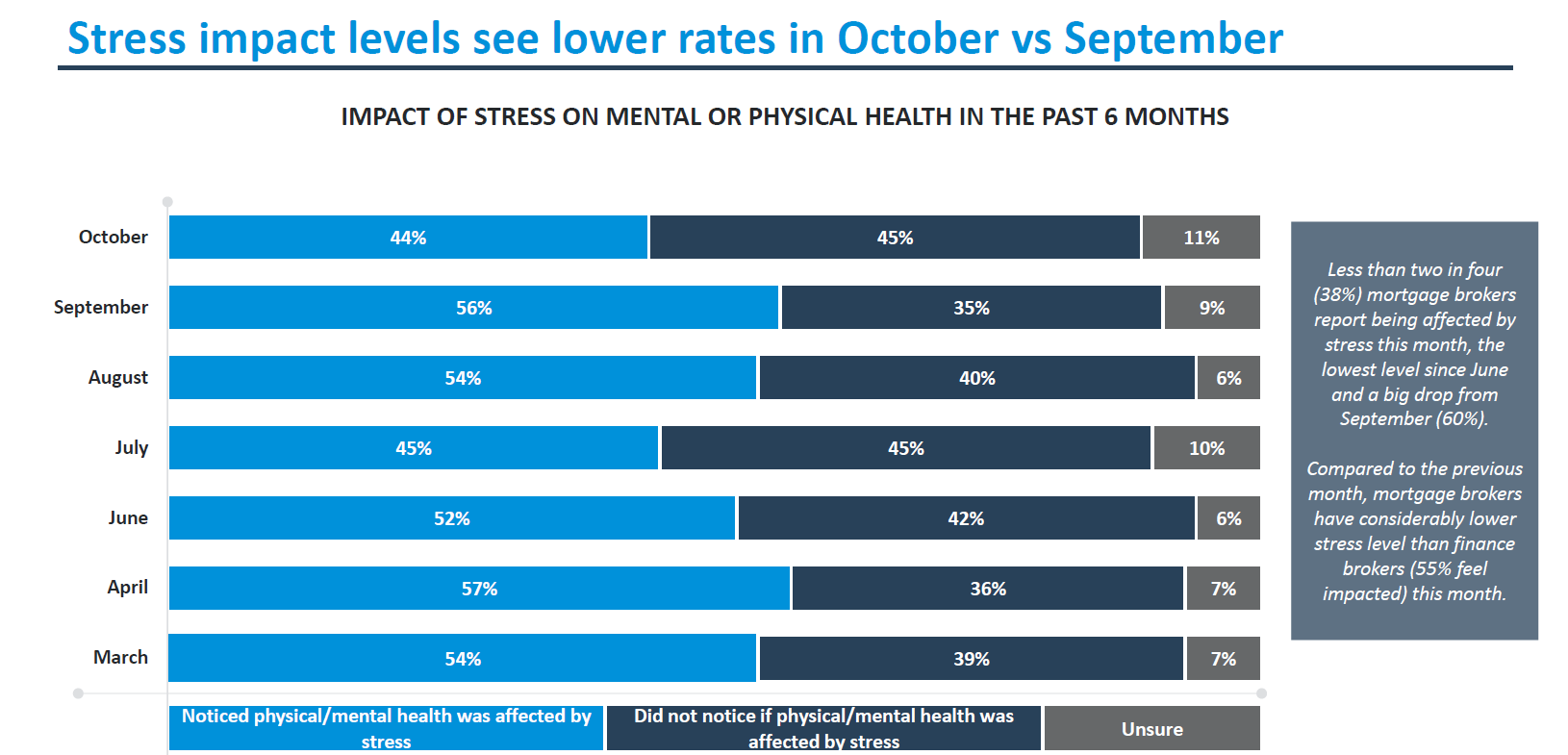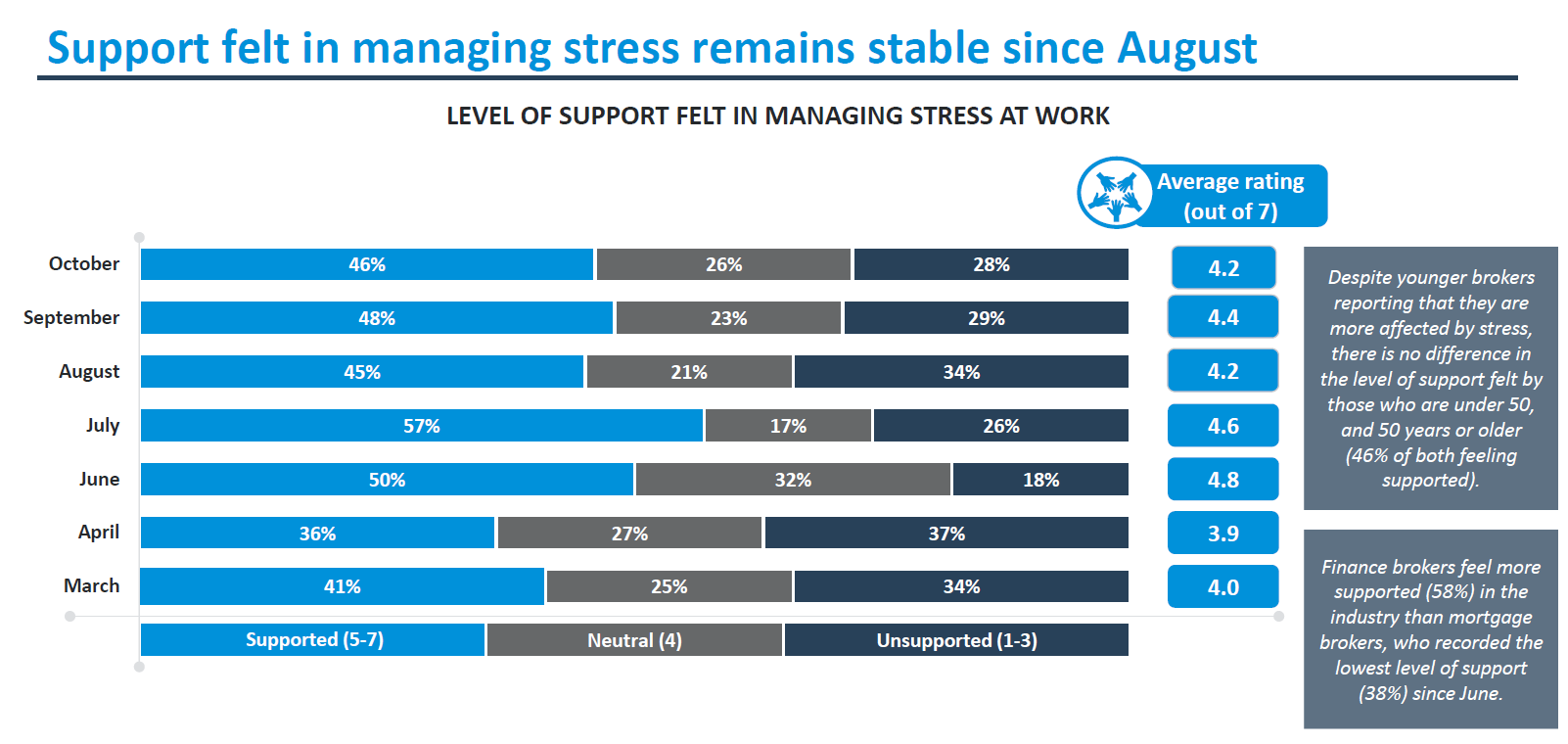FBAA's efforts making a positive difference, says Peter White

The latest FBAA monthly broker poll shows significant progress has been made in lowering the stress levels of mortgage brokers.
The survey of 100 FBAA members brokers carried out in October in partnership with CoreData shows that just 38% of mortgage brokers were affected by stress in October – the lowest level since June and down from 60% in September.
The poll asked brokers if they had noticed their mental or physical health had been affected by stress in the past six months.

Source: FBAA monthly broker poll, October 2024
The data also revealed that the top causes of stress for mortgage brokers and finance brokers combined were:
- workload – 40%;
- financial challenges – 33%;
- government policies – 23%;
- income/payment issues – 23%; and
- family/romantic relationships – 23%.
When separating out mortgage brokers and finance brokers, workload was a bigger source of stress for finance brokers (47%) than mortgage brokers (36%); while government polices caused more stress for mortgage brokers (26%) than finance brokers (18%).
Younger brokers (those aged under 50) felt much more stressed by their workload and financial challenges than older brokers (52% vs 29%) and 44% vs 23%, respectively.
Support in managing stress
The FBAA October poll also revealed that the level of support brokers felt in managing stress had remained stable since August. Despite younger brokers reporting that they felt more affected by stress, there was no difference in the level of support felt by those aged under 50, and those 50 years or older (with 46% of both feeling supported).
Finance brokers felt more supported (58%) in the industry than mortgage brokers, who recorded the lowest level of support (38%) since June.

Source: FBAA monthly broker poll, October 2024
FBAA managing director Peter White (pictured above) said the FBAA had been leading ongoing conversations around managing stress and anxieties, and this was making a difference.
“It’s good to see that what we are doing in the area of mental health is having a positive effect, and this underlines the importance of continuing this work,” said White.
“Specifically we are providing support through our Employee Assistance program via Assure Counselling and to members of our Wellness Hub. Overall there is now increased awareness by the entire industry.”
While the FBAA is already taking significant steps to address stress among brokers, White said the government has a role to play too.
“It can intervene in some industry matters to ensure brokers are treated fairly with clawbacks and net of offset commission, which we know leads to stress and pressure. Some may consider these different issues but I believe it plays a part.
“The FBAA has submitted multiple papers to government on this issue as well as engaging in many meetings. We will continue this until we see major progress.”
Other findings of the FBAA broker poll
The October survey is the seventh monthly poll of brokers, which started in March this Year. Conducted by the FBAA and CoreData, they ask FBAA brokers a range of questions.
“Front line market feedback allows us to gain a better understanding of the key issues our members face as well as other demographic information,” White said. “This assists us to be better informed as we deal with government and regulators.”
One of the results from October that stands out to White is the fact that nearly all brokers are accredited by both second-tier banks (97%) and non-bank lenders (95%).
“This highlights why consumers use brokers” he said. “While the big banks still have a large percentage of the market, borrowers need choice, particularly with best interests duty.”
The poll showed that 93% of brokers are accredited with major banks, while for credit unions and building societies this percentage is lower, at 56%, with just 11% accredited for private lenders.
When it came to qualifications, as well as a Certificate IV in Finance and Mortgage Broking, 68% of mortgage brokers and finance brokers also held a Diploma of Finance and Mortgage Broking Management.



